Senior legal figures have expressed concerns

Lady Hale and Lord Sumption are among the UK judges who could be forced to step down from Hong Kong’s highest bench following China’s new national security law.
The Beijing-enforced security measure, aimed at restricting opposition to the ruling communist regime, has raised concerns over the independence of UK judges sitting on the Hong Kong Court of Final Appeal.
The security law, which has been criticised for clamping down on protest and freedom of speech since implemented last month, was directly imposed onto Hong Kong without consultation from the city-state’s legislature. Critics argue that China’s controversial law breaches the long-standing ‘one country, two systems’ principle established following the British colony handover in 1997.
It’s a long-established tradition that non-permanent senior judges from the UK and other commonwealth states sit on Hong Kong’s highest court, alongside permanent judges from the territory. The ten judges from the UK include president and former presidents of the Supreme Court, Lord Reed, Lord Neuberger and Lady Hale. Also sitting on the panel is former UK Supreme Court judge Lord Sumption.
According to the new security law, judges will be removed from their post if they make “any statement or behave in any manner endangering national security during the term in office”.
Although it remains to be seen what the new law means for the non-permanent UK judges, several senior legal figures have shared their concerns about Hong Kong’s independent judiciary. Such independence, enshrined by the city-state’s constitution, known as the Basic Law, is one of the many post-handover freedoms which has long been considered integral to its standing as a global financial hub.
For Lord Mackay of Clashfern, who was Lord Chancellor for ten years in the run-up to the 1997 handover, this raises worry about judges’ role in the former British colony.
Speaking to The Times, he said, “their position could soon become untenable because we cannot ensure that they will be allowed to remain independent”. He continued: “It will be very difficult for them if they are in a position where they had to come to a decision that in their view wasn’t right.”
Meanwhile, Lord Falconer of Thoroton, the Shadow Attorney-General, said that “it is very difficult to see the judges going on for any longer on the court — unless Hong Kong’s democracy movement wants them to stay”.
According to Lord Patten of Barnes, Hong Kong’s last colonial governor before the handover, the security law “blurs the line between the executive and judiciary”. He argues that it allows Carrie Lam, Hong Kong’s chief executive, to decide which judges sit in national security law cases and whether certain security hearings should be held privately. It also allows Beijing authorities to transfer Hong Kong court cases to be heard in mainland China, he told the newspaper.
Patten also suggested UK judges look “very hard” at what Chinese authorities are proposing, adding “what the Chinese have said so far is that security law supersedes the Basic Law. I’m not sure how far that goes but it raises all sorts of practical issues for the British judges”.
This follows comments made by Tom Tugendhat, chairman of the UK’s parliamentary foreign affairs select committee, who questioned whether UK judges should continue in their Hong Kong roles. Speaking to The Guardian, he asked: “How can they do that, how can they defend civil rights and commercial rights if they are being violated by the very law they are sent to uphold?”


